Tying the knot when living with type 1 diabetes
Not letting the numbers stop you from enjoying your special day to the fullest.
Living with type 1 diabetes can be full of planning, from a normal day to special events such as your wedding day. Some people may feel that diabetes can be a barrier to enjoying this special day, maybe due to fear of hypos (hypoglycaemia) whilst walking down the aisle, or having unpredictable glucose levels interfering with the celebrations because of stress.
In this blog, I will share some ideas that worked for me in preventing diabetes from affecting my wedding day.
I was diagnosed with Type 1 diabetes when I was 4 years old. At that moment, I know that my family asked themselves if I would ever have a ‘normal life,’ including one day having a family.
In time, diabetes became a positive part of my life within certain areas. I got involved in setting up camps for children with diabetes and doing voluntary work to help motivate people to live their lives to the fullest.
This opened the pathway to meeting my husband, who also lives with type 1 diabetes and has done amazing things to support others living with it too.
We decided to get married just before the COVID pandemic started, and so are part of the COVID weddings generation...Honestly, diabetes was not our main concern when it came to planning our wedding, but we dealt with a lot of stress in having to move our wedding date 3 times!
Stress pushes both of our glucose levels up, so we tried to find ways of enjoying the process such as making ‘days of it’ when planning. This helped to keep our levels a bit more in range, with less stress felt.
When the wedding finally happened, we had an amazing day and honestly, diabetes was the last of our worries.
Things such as checking our glucose levels, carbohydrate counting and giving insulin are not an exemption on your wedding day. Diabetes is still there, but there are ways of adjusting it to your day and not adjusting your day to diabetes.
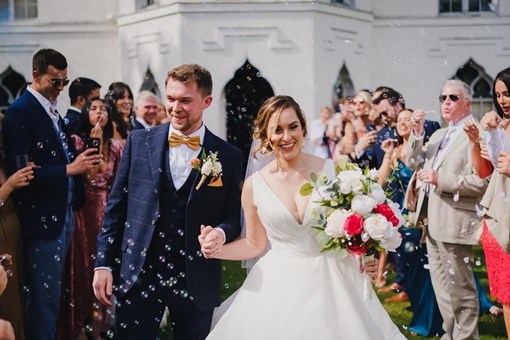
Your wedding dress and suit
Both of us decided to choose our preferred dress and suit first, without thinking of where to put our devices. We both use an insulin pump and continuous glucose monitor (CGM) which can be quite visual. I decided not to show my devices on my wedding day, however my husband was ok with showing his pump.
You can decide and plan in advance whether you want to keep using the same diabetes method for the day; I decided to keep using my insulin pump and to get a tight pouch. My CGM was in my abdomen.
Deciding on this approximately 10 days before the wedding is important, as you might not want to lose a sensor just because it is in the wrong place.
You can also choose to wear your devices proudly and use the sensor in your arm.
If you are on multiple daily injections (MDI), I would suggest avoiding injecting in your arm (if wearing a sleeveless dress) 1-2 days before your special day, to prevent bruises from appearing.
I would advise not choosing a dress just because it’s easier to wear with your devices. Choose your dress/suit because you like it and then think about ways to wear your tech.
It is similar to life with diabetes, you don’t have to change everything for your diabetes, you involve diabetes in what you do.
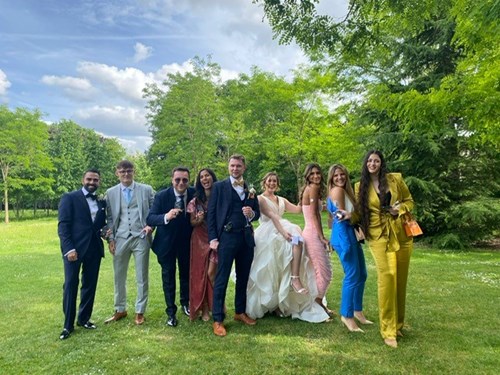
Getting ready for your day
Feeling nervous can spike or lower your glucose levels due to adrenaline. Be aware that your glucose levels can be quite hard to manage, even the night before your wedding.
Speak to your consultant to consider making changes to your insulin depending on how you react to nervousness. Personally, I was quite nervous in the morning whilst doing my hair and makeup which made me lose my appetite. It was very important to still try to keep my meal routine and avoid not eating the whole day!
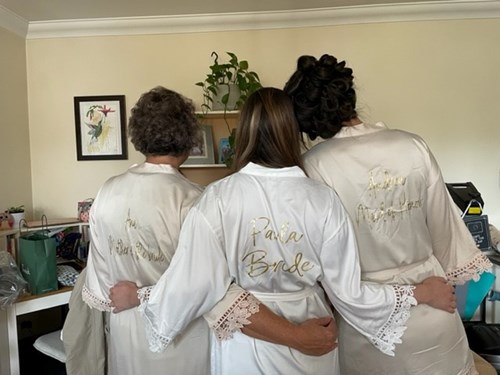
My husband was not feeling nervous at all so his levels were quite stable before the wedding started. So, it is always a good idea to find ways of trying to relax and enjoy.
Having a look at our glucose levels and acting accordingly was essential for us on the day. Monitoring is therefore always a good idea.
Avoiding hypos
One of our biggest “what ifs” of the wedding day was “what if we go low just before the ceremony?”.
Keeping an eye on your glucose levels before the ceremony and having glucose available will help to ease that worry. Asking a bridesmaid/groomsmen or family member to watch out for your behaviour and explaining what symptoms you present if low is ideal. You may also want to ask if they can have glucose with them too.
Some of the symptoms may be blurry vision, feeling dizzy, sweating, increased heart rate and paleness, amongst others.
Dancing was our favourite part of the wedding. Dancing of course involves aerobic physical activity and is usually after dinner, which means that you will have active insulin, possibly increasing your risk of hypoglycaemia.
Considering reducing your insulin and/or having an extra snack before the first dance can help you to avoid hypos on the dancefloor.
We both reduced our insulin for dinner to prevent this from happening.
Cheers to the happy couple
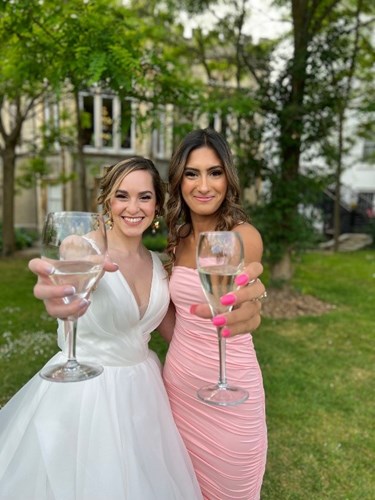
Alcohol can play with glucose levels a lot if we are not aware of its carb content, or if we are not aware of what the effect of different types of alcohol is on our glucose levels.
I usually prefer to have low-carb drinks such as whisky or sugar-free spirits. This way I don’t have any spikes.
My husband prefers beer, which contains carbohydrates and therefore might need extra insulin if having more than one drink.
Alcohol can also push your levels down later on in the night which can be quite risky if not able to differentiate between hypo symptoms and feeling tipsy.
If you want to drink on your wedding night and you don’t usually, experiment beforehand and analyse what effect it has on your glucose levels to be prepared for your wedding day. Not drinking a lot was key for us to be able to enjoy all the moments of the night fully.
Delicious food
The good thing about food on your wedding day is that you get to choose it. We went for bowl food which is quite a different option to most.
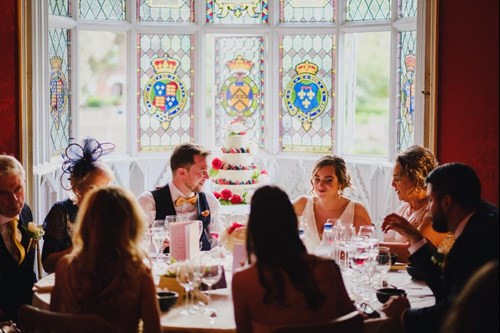
Finding a balanced option including a mix of carbohydrates (rice, potatoes, bread, pasta), protein (chickpeas, lentils, fish, chicken, beef or lamb) and vegetables can help your glucose levels to be more stable throughout the night.
We chose: a bowl of lamb with rice and vegetables, another one of fish with chips and peas, and a vegetarian one with falafel.
You can also ask the catering company if they have nutritional information for their options. This way you can have the carb counting done for your meal and dessert.
We had 10 of our guests also living with type 1 diabetes from different parts of the world, so we were also thinking about them.
You might also need to consider the canapes or after-dinner snacks that some places offer. Even though they might be small, they will contain carbohydrates.
Soft drinks can also be an issue if you don’t make sure there are sugar-free options available. Sugary fizzy drinks can spike your glucose levels significantly so it is better to get your carbohydrates from foods and not from sugary drinks. We needed to ensure that the catering at the venue was going to offer these options, as it was initially only fruit juices and sugary fizzy drinks on offer.
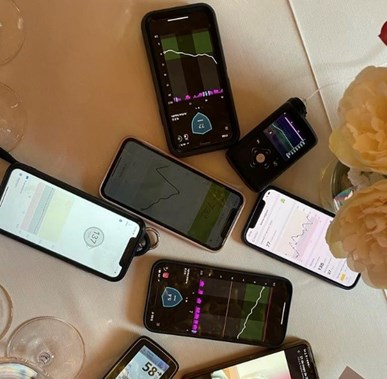
Image: Glucose levels of some of our guests with Type 1 diabetes after dinner.
Lowering expectations
Neither of us was worried about having perfect glucose levels on our wedding day. It is hard enough to deal with all the mixed emotions on the day, and we feel very proud of being able to spend time with our family and friends without any limitations caused by our diabetes.
We were aware that a low or a high could happen, however setting our minds on solving the issue and not worrying about it helped to take out the weight of our chronic condition.
Your wedding day can be a good opportunity to let others help you. From carrying your hypo treatment, insulin and meter, to making you aware if they notice something different in you.
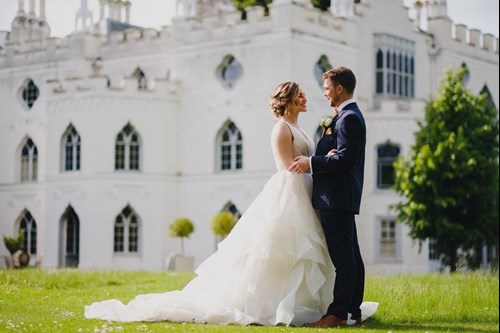
Image: My husband and I, both living with type 1 diabetes, after not having any lows walking.
I encourage you to find ways of adapting diabetes to your life and not adapting your life to diabetes. This can be achieved with good teamwork between you, your diabetes team, and possibly your loved ones. Diabetes should not stop you from achieving your dreams.
Have you attended a wedding of someone living with type 1 diabetes or have you gotten married whilst living with T1D? Tell us your experience.




